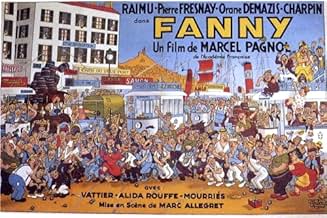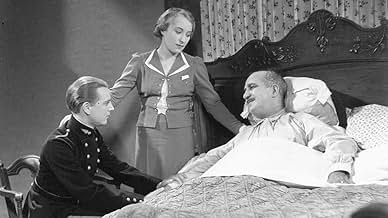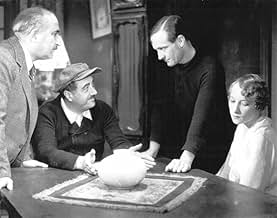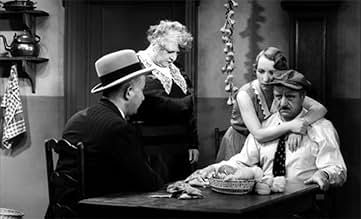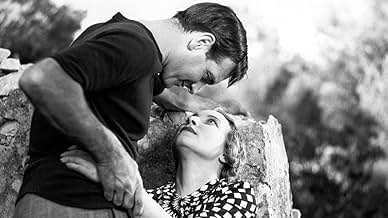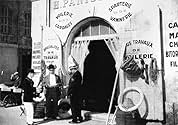IMDb RATING
7.8/10
2.1K
YOUR RATING
After Fanny's boyfriend leaves her and sails away, she finds out she's pregnant.After Fanny's boyfriend leaves her and sails away, she finds out she's pregnant.After Fanny's boyfriend leaves her and sails away, she finds out she's pregnant.
Fernand Charpin
- Honore Panisse
- (as Charpin)
Auguste Mouriès
- Félix Escartefigue
- (as Mouriès)
Robert Vattier
- Albert Brun
- (as Vattier)
Édouard Delmont
- Dr. Felicien Venelle
- (uncredited)
Pierre Prévert
- Un voyageur du tramway
- (uncredited)
Annie Toinon
- Amélie
- (uncredited)
Featured reviews
10rsoonsa
FANNY is the second film of a trilogy, based upon a play by Marcel Pagnol, from which all three works are taken, featuring most of the cast of excellent actors which made the stage original a great artistic and popular success, including Raimu, Charpin, Pierre Fresnay, and Orane Demazis as Fanny, an assemblage which remains faithful to the heart of the original. By repudiating the normal placement of concurrent French films made in Parisian studios, and producing the work in his native Marseilles, in Provence, Pagnol achieves a finely-hewn naturalism which is very congenial to the scenario, dealing as it does with a hard-working bourgeoisie whose lives are in concert with rhythms of a major seaport. Fanny's passionate attention to Marius (Fresnay) results in her pregnancy from their farewell coupling at the denouement of the first of the trilogy, MARIUS, with her lover falling prey to the lure of a seafaring life and she, abandoned, accepts a proposal of marriage from a much older M. Panisse (Charpin), in order to save the reputation of her family. The love of Panisse for the child of Fanny is the moving force in what must be the inevitable fulfillment of the storyline, i.e., the return of Marius to claim his erstwhile fiancée and his true child in a scene which brings the best from Demazis, Fresnay, and Raimu as Cesar, the father of Marius and lifelong friend of Panisse. Pagnol directed only the finale of the trio, and selects for FANNY Marc Allegret, who leads the cast with distinction, displaying particular skill when allowing Pagnol's magnificent dialogue to be developed in what is essentially a filmed work for the stage, with few sets, and who allows liberal emphasis upon the plastic Raimu, who is, after all, the most important presence in this romantic masterpiece.
I have just finished watching Proof, a film released in the year of our Lord, 2005, which is adapted from a stage play in which the director has gone to great pains to hide the fact that his work is based on the play. flash back 70 years and we have a movie made that looks like a filmed stage play with real locations replacing the stage sets. All early sound movies feel set-locked as people talk and deliver within the range of the camera. Therefore, to hold the interest to the modern viewer, the dialogue and acting must be believable and engaging. The film fails to achieve it for the most part because the performance of the actress playing Fanny is a total success even though she was reprising her role from the stage. First time director, Pagnol adapting his own stage works suffers from a non-visual eye. The delight, is French star Raimu who delivers a performance still worthy to the eye even today. There is a reason Orson Welles called him a genius. The melodramatic plot of a scorned, (maybe that is too strong a word: even abandoned is too strong because she never lets on to her man that she does not want him to leave) woman who is pregnant is passé though common in the literature of the period. I remember a tracking shot that impressed me as the camera follows Fanny through the streets as she suspects she is pregnant. In the way it is handled and executed, it is cinematic authorship at its finest. It is a film in the middle of the trilogy, therefore there are loose ends left to be resolved. All movies are time capsules, it is said, therefore approach this with the right attitude and you might be rewarded.
Fanny (1932) :
Brief Review -
The best possible follow-up to Cult Classic 'Marius' and a highly sensitive content far ahead of its time. So this was exactly 37 years before Bollywood adopted this concept with "Ek Phool Do Mali" in 1969, which was considered ahead of its time due to the sensitivity of the topic then just imagine how far ahead Fanny was for its time? Truly unthinkable. And the maturity of this concept was beyond acceptance for 30s audience. French Cinema created a Classic Tear-jerker like 'Marius' (1931) but the way that film ends certainly gives a chance to a great follow-up which could have easily been predicted while watching Marius only. Fanny begins right where Marius ended as we see Fanny getting pregnant by Marius child after Marius had left to acquire his wild dreams. Panisse asks her to Marry him and promises to love the child like his own but things get messy as all of sudden Marius returns to visit the town for a short time of period. Okay, this was highly predictable and even the next things coming were pretty easy to predict or rather i would say things go exactly as you would have liked it to predict and therefore Fanny ends on an matured and fulfilling note. The problem here is, Fanny follows a Cult film which puts a lot of burden on it so obviously it stays behind its predecessor. The emotional quotient is not high when there was a potential for it and most importantly it doesn't make the characters look intellectual which it should have done considering their intellectual behaviour in the predecessor. However, for any Normal film it is overwhelming for sure. I dare everyone, beat the time limit of this content if you can. It was at least 2-3 decades ahead of its time for the impact in real life. Overall, its a deserving sequel which deserves individual love instead of underwhelming praise caused by comparison with its prequel.
RATING - 7.5/10*
By - #samthebestest
The best possible follow-up to Cult Classic 'Marius' and a highly sensitive content far ahead of its time. So this was exactly 37 years before Bollywood adopted this concept with "Ek Phool Do Mali" in 1969, which was considered ahead of its time due to the sensitivity of the topic then just imagine how far ahead Fanny was for its time? Truly unthinkable. And the maturity of this concept was beyond acceptance for 30s audience. French Cinema created a Classic Tear-jerker like 'Marius' (1931) but the way that film ends certainly gives a chance to a great follow-up which could have easily been predicted while watching Marius only. Fanny begins right where Marius ended as we see Fanny getting pregnant by Marius child after Marius had left to acquire his wild dreams. Panisse asks her to Marry him and promises to love the child like his own but things get messy as all of sudden Marius returns to visit the town for a short time of period. Okay, this was highly predictable and even the next things coming were pretty easy to predict or rather i would say things go exactly as you would have liked it to predict and therefore Fanny ends on an matured and fulfilling note. The problem here is, Fanny follows a Cult film which puts a lot of burden on it so obviously it stays behind its predecessor. The emotional quotient is not high when there was a potential for it and most importantly it doesn't make the characters look intellectual which it should have done considering their intellectual behaviour in the predecessor. However, for any Normal film it is overwhelming for sure. I dare everyone, beat the time limit of this content if you can. It was at least 2-3 decades ahead of its time for the impact in real life. Overall, its a deserving sequel which deserves individual love instead of underwhelming praise caused by comparison with its prequel.
RATING - 7.5/10*
By - #samthebestest
The sequel to "Marius" the year before stays in the same vein and is the same kind of staged theatre all the way, with the same kind of virtuoso performances by all the actors, but there is another director, and you miss the Alexander Korda flamboyance and liberal sweeps and flow of the movie tempo. This film is more like chamber theatre all the way, and you don't even see much of the harbour, the glorious ships, the street life and the joints. Fanny, left alone and pregnant by Marius going to sea for five years, marries another older suitor, just to give her child a future and safe environment, and it works out well, until Marius comes back after only two years as a most unsuspected surprise and does his best to complicate things but immediately leaves again. The story isn't much, it is very inferior to the first part, but there is a third part four years later, which will show the end of the story, directed by Marcel Pagnol, the author, himself - he made many films besides being a prolific Provence writer.
If you can get by the first fifteen minutes, get into the leisurely pacing and that fact that nothing is going to explode and no one shoots anybody or stabs anyone in the eye, and the film is about learning to live with other human beings, about being a parent, about falling and staying in love, perhaps you'll come to love this film, too.
The trilogy is set in another time long gone--Marseilles, a provincial fishing village, where Cesar and his son operate a sort of bar where locals drift in and out and play cards; a pretty young woman sells seafood outside, and she's known son Marius since they were children. Enough said: except that the acting is amazingly naturalistic for a 1930's film, that the performance by famed French entertainer Raimu is beyond words, is simply astounding in his range of emotions, his understanding of the human condition. This understated drama is a quiet masterpiece.
The trilogy is set in another time long gone--Marseilles, a provincial fishing village, where Cesar and his son operate a sort of bar where locals drift in and out and play cards; a pretty young woman sells seafood outside, and she's known son Marius since they were children. Enough said: except that the acting is amazingly naturalistic for a 1930's film, that the performance by famed French entertainer Raimu is beyond words, is simply astounding in his range of emotions, his understanding of the human condition. This understated drama is a quiet masterpiece.
Did you know
- TriviaFamed restaurateur and founder of California cuisine, Alice Waters, was so taken with the Fanny trilogy that she named her Berkeley restaurant Chez Panisse. The café upstairs from the restaurant is decorated with posters from the films Marius, Fanny, and César. Waters also named her own daughter Fanny and opened a small breakfast café in Berkeley called "Café Fanny" in 1984 which closed in March 2012.
- ConnectionsEdited into Histoire(s) du cinéma: Une histoire seule (1989)
- How long is Fanny?Powered by Alexa
Details
Box office
- Gross US & Canada
- $8,262
- Opening weekend US & Canada
- $7,720
- Jan 8, 2017
- Gross worldwide
- $8,262
- Runtime
- 2h 20m(140 min)
- Color
- Aspect ratio
- 1.20 : 1
Contribute to this page
Suggest an edit or add missing content


